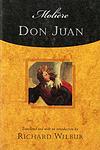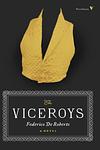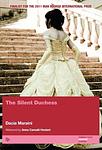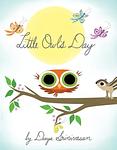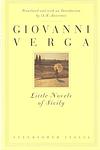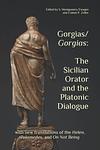The Greatest "Sicily" Books of All Time
Click to learn how this list is calculated.
This list represents a comprehensive and trusted collection of the greatest books. Developed through a specialized algorithm, it brings together 284 'best of' book lists to form a definitive guide to the world's most acclaimed books. For those interested in how these books are chosen, additional details can be found on the rankings page.
Genres
Countries
Date Range
Reading Statistics
Click the button below to see how many of these books you've read!
Download
If you're interested in downloading this list as a CSV file for use in a spreadsheet application, you can easily do so by clicking the button below. Please note that to ensure a manageable file size and faster download, the CSV will include details for only the first 500 books.
Download-
1. The Leopard by Giuseppe Tomasi di Lampedusa
"The Leopard" is a historical novel set in 19th-century Sicily, during the time of the Italian unification or Risorgimento. It centers on an aging, aristocratic protagonist who is coming to terms with the decline of his class and the rise of a new social order. The narrative weaves together personal drama with the larger political and social upheaval of the time, providing a rich, nuanced portrait of a society in transition. Despite his resistance to change, the protagonist ultimately recognizes its inevitability and the futility of his efforts to preserve the old ways.
-
2. To Each His Own by Leonardo Sciascia
"To Each His Own" is a mystery novel that follows a professor in a small Sicilian town who becomes obsessed with solving a double murder after receiving an anonymous letter. As he delves deeper into the investigation, he uncovers a web of corruption and deceit that reaches to the highest levels of power in his town. Despite his best efforts to bring the truth to light, he finds himself in danger as those involved in the murders will stop at nothing to keep their secrets hidden.
-
3. Don Juan by Molière
This comedic play explores the life of a libertine nobleman who is infamous for his seduction of women. The protagonist is a man who lives by his own rules, unburdened by morality or religion, and who takes pleasure in manipulating others for his own gain. His actions eventually lead to his downfall when he refuses to repent for his sins, resulting in a dramatic, supernatural punishment.
-
4. The Viceroys by Federico De Roberto
"The Viceroys" is a historical novel set in 19th century Sicily, during the Italian unification. The story revolves around the aristocratic Uzeda family, who are trying to retain their power and influence in the changing political landscape. The narrative explores themes of power, corruption, and the decline of the aristocracy through the lens of this manipulative and scheming family. The book is a critique of the social and political system of the time.
-
5. Conversations in Sicily by Elio Vittorini
"Conversations in Sicily" is a semi-autobiographical novel that explores the journey of a man returning to his native Sicily after many years away. The protagonist's journey is both physical and emotional as he reconnects with his past, his culture, and his mother, while also confronting his disillusionment with the political and social realities of the time. The narrative is filled with poetic and philosophical dialogues, providing a deep exploration of Sicilian life, identity, and the human condition.
-
6. The Silent Duchess by Dacia Maraini
This novel is a poignant exploration of the life of an 18th-century Sicilian noblewoman, born into privilege yet silenced by a congenital disability. Through her eyes, readers experience the constraints and expectations placed on women of her time, navigating a world where her voice is metaphorically and literally stifed. Despite the limitations imposed by her society and her own family, she embarks on a journey of self-discovery and defiance, seeking love, intellectual fulfillment, and a sense of identity within the opulent yet oppressive confines of her aristocratic life. The narrative delves into themes of power, gender, and the quest for personal freedom, painting a vivid picture of historical Sicily and the resilience of the human spirit.
-
7. Day Of The Owl by Leonardo Sciascia
This novel delves into the murky world of Sicilian society, where the Mafia's influence permeates every level. When a businessman is murdered, the investigation is met with a wall of silence, indicative of the fear and complicity that hampers the pursuit of justice. The protagonist, a determined police captain, faces numerous obstacles as he attempts to unravel the complex web of connections that shield the true culprits. His quest exposes the deep-rooted corruption and the challenges of confronting an entrenched criminal organization that operates within a code of silence and intimidation.
-
8. Mastro Don Gesualdo by Giovanni Verga
The book is a poignant tale set in 19th-century Sicily, following the life of a self-made man who rises from peasant origins to wealth and status through hard work and marriage. Despite his success, he struggles with societal acceptance and personal fulfillment, as his newfound position brings neither the respect of the aristocracy nor the love of his wife. The narrative delves into themes of social mobility, the rigid class structures of Italian society, and the ultimate emptiness of material success without personal connections, painting a vivid picture of the protagonist's tragic quest for recognition and happiness.
-
9. The She Wolf And Other Stories by Giovanni Verga
"The She Wolf and Other Stories" is a collection of vivid and emotionally intense short stories that delve into the lives of peasants and fishermen in 19th-century Sicily. The narratives, characterized by their realism and concise prose, explore themes of poverty, passion, and the struggle for survival in a changing world. The titular story, "The She-Wolf," stands out as a powerful tale of a fiercely independent and manipulative woman who embodies both the allure and the dangers of untamed nature. Through these stories, the book offers a window into the harsh realities of rural Sicilian life, highlighting the human condition and the social dynamics of the time.
-
10. Little Novels Of Sicily by Giovanni Verga
The book is a collection of short stories that delve into the lives of Sicilian peasants and fishermen in the late 19th century, offering a vivid portrayal of their daily struggles, passions, and traditions. Through a series of evocative narratives, the work captures the essence of rural Sicilian life, with its harsh realities and simple joys, while also exploring universal themes of love, honor, and the inexorable forces of change. The author's masterful use of regional dialect and keen observation of human nature render a poignant and authentic picture of a world where the beauty of the landscape contrasts sharply with the toil and hardships of its inhabitants.
-
11. The Wine Dark Sea by Leonardo Sciascia
In "The Wine Dark Sea," readers are presented with a collection of short stories that delve into the complexities of Sicilian life, exploring themes of justice, truth, and the human condition. The narrative weaves through tales of ordinary people confronted with extraordinary situations, often involving crime and moral dilemmas. The author's sharp observations and subtle irony highlight the intricate relationship between the individual and the often-oppressive societal structures, painting a vivid picture of a land steeped in beauty and contradiction, where the line between right and wrong is as blurred as the horizon on the titular wine-dark sea.
-
12. Idylls by Theocritus
"Idylls" is a collection of pastoral poems that offer a romanticized view of rural life in ancient Greece. The work is composed of short, lyrical pieces that celebrate the beauty of nature, the simplicity of country living, and the loves and sorrows of shepherds and nymphs. Through vivid dialogues and songs, the poems depict various scenes, from idyllic landscapes to rustic festivals and competitions, capturing the essence of Hellenistic culture. The bucolic tradition established by these poems would go on to influence later poets in both the classical and modern eras, setting the standard for the pastoral genre.
-
13. Gorgias/Gorgias : The Sicilian Orator And The Platonic Dialogue by Coleen P. Zoller, Jurgen R. Gatt, S. Montgomery Ewegen
This book provides a comprehensive analysis of the Platonic dialogue centered on the figure of Gorgias, a renowned Sicilian orator and sophist. It delves into the philosophical conversations between Socrates and Gorgias, along with other interlocutors, exploring themes such as rhetoric, justice, and the nature of the good life. The text examines the intricacies of Socratic dialectic and the contrast between philosophical inquiry and the art of persuasion practiced by sophists. Through this exploration, the book sheds light on the enduring questions about the relationship between power, knowledge, and ethics in the context of human discourse and action.
Reading Statistics
Click the button below to see how many of these books you've read!
Download
If you're interested in downloading this list as a CSV file for use in a spreadsheet application, you can easily do so by clicking the button below. Please note that to ensure a manageable file size and faster download, the CSV will include details for only the first 500 books.
Download

